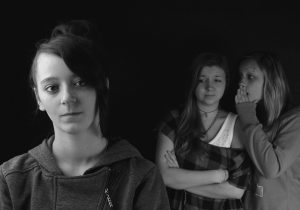Has your child been accused of bullying? You may admit, “My daughter can be a little mean sometimes, but… a bully?!” Teasing, name-calling, threatening, telling rumors and fighting are easy for adults to recognize as inappropriate. Youth may not understand what is unacceptable, or they can excuse certain behaviors if they pay off. Maybe she is a bully under the influence of her peers; this can be tough for parents to catch and even harder to accept.
Bullying is when one person has some sort of power (older, more controlling, bigger) and repeatedly does something directed towards another with the intension of hurting that person. Bullying can be physical, verbal, relational or virtual (online). Often youth understand the power that these aggressive behaviors hold but do not understand the consequences.
To help your child understand how words and actions affect others, consider these ways you can handle it when your child says:
“What?! It’s funny!”
Parent: Would/did the other person think it was funny?
“I was only teasing.”
Parent: How would you like someone to say that to/about you?
“It’s no big deal.”
Parent: How do you think it made the other person feel?
“No one got hurt.”
Parent: Would you want someone to hit/push/touch you?
“That’s what so-and-so said.”
Parent: What if it’s not true? If it is, would you want others to know?
You can guide a child who bullies through situations they feel they can’t win without having to be aggressive. No matter how strong bullies may appear on the outside- under the surface- they feel afraid, insecure and are missing the peer relationships they long for.
To Help A Child Who Bullies:
- Point out and help build on her strengths.
- Help her develop skills that will support her being accepted by peers.
Children who bully often feel that they have to earn attention and approval through negative means, because they lack the social skills to win friends. For example, your child might want to play sports but be uncoordinated or feel embarrassed by her reading abilities or academic skills.
Children are not born knowing how to show kindness, but they can learn how to be mean very quickly if they do not first learn how to gain confidence and self-empowerment with help from caring adults.
For more tips and resources, visit the National Bullying Prevention Center or the U.S. Department of Health and Human Services resource, StopBullying.gov.


